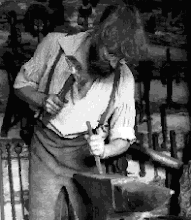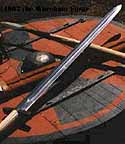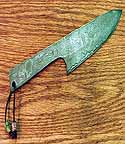"... My 14 year old son / daughter is keen to learn how to do blacksmithing. Are your classes or private lessons open to teens?..."
I am getting an increasing number of e-mail messages like this one. Often enough that I feel I needed to create a 'standard reply' to the question. My concerns in accepting students younger than 16 is based on my own experience - both working and teaching.
My response question is : 'How physically robust and developed and how mentally mature is the young person.'
I normally set 16 as the lower limit for a potential student in blacksmithing. This is primarily since below that age - with boys especially, the possible range of size, strenght and co-ordination is so wide.
The tools required to undertake any effective work at the forge are a minimum of 800 gms / about 1 1/2 lbs. The student MUST be able to not only move this wieight - but more importantly be able to CONTROL the tool in motion. Now consider the amount of repetition required - the course extends over a 8 hour day. About 50 - 60% of that time is applied to direct forge work.
As a comparison, the basic forging hammer is somewhat heavier than a standard nail driving hammer. The degree of control required is considerably greater.
For several of the basic forging exercises, use of an even heavier 1000 gm hammer is required (making tongs).
I am quite concerned about the effect of the kind of high impact physical activities that blacksmithing requires on the body. For that reason, I devote considerable attention not only to related safety concerns, but also to physical dynamics. Using a forging hammer correctly and effectively is not like driving nails. Individual body size, strength and proportions will effect what determines the most effective - and safe - working pattern for each student.
A number of concerns apply most specifically to teen aged students.
The truth is that teen agers are by definition still growing and maturing. This effects raw strength, physical coordination, bone and joint solidity, attention span, potential frustration level.
As a blacksmith works, all these factors combine to produce physical strain. As someone who is light framed (ie - not that strong) myself, I know that joints and tendons are cushioned by the muscles. Younger joints and bones are not as strong to begin with, and when there is less muscle mass supporting the underlaying structure simple fatigue can result in potential injuries.
What happens is that someone attempting to use a hammer too heavy for their effective control will instinctively hold the handle with a tighter grip. This in turn tightens the tendons. As fatigue mounts, the likely hood of the hammer head striking slightly off angle increases. If this happens, the hammer suddenly will rotate, the firm grip transfering the rotation into the arm and rigid tendons. The potential exists to physically damage these tendons at the elbow. Tendon damage is basicly forever.
There is often a problem with less mature students with simple frustration. Without ability to manage the hammer weight - effectively - it will just take too long to finish the various forming tasks during the day. Also, there is a noticeable tendency to keep working well past the point where the student is obviously too tired to continue. The very control required for effective work, and more importantly to prevent physical injury, has long been lost. I obviously watch for this with all students, but it can be very difficult to convince even an adult student that they stop working during a paid program. As you might expect, I try to keep the instruction paced to the group average. Any given course may not get through the entire outline as posted - it all depends on the work speed of the group.
I have had boys as young as 14 as students before who have been sucessful with the work in the course. Mind you - these have been the 'built like a football player' type of early developed young men. (In some cases notably larger and stronger than I am!) I should also point out that teen aged GIRLS physically and mentally mature at a younger age, although raw strength may be more of a consideration.
So I am willing to accept a younger student - with the clear understanding that the PARENT is knowingly accepting the greater possibility of a less sucessful completion of the course outline. More importantly the parent must also clearly understand the risks related to the activities and take full responcibility for any possible injuries that may occur.
One other possibility is to accept a parent and student working as a team. I will not charge extra for this - only one work station will be provided which will be shared between the two. Ideally this allows the younger student to do as much work as they are able, with the parent assisting on heavier physical tasks. Work will be limited to the use of a gas forge only (due to space constraints around the coal forge).
I would consider any potential student under 14 too young to be involved in the normal scheduled courses. I am willing to discuss the possiblity of designing a 'Private Session' program for individual students.
Darrell
Friday, April 28, 2006
Subscribe to:
Post Comments (Atom)




















No comments:
Post a Comment